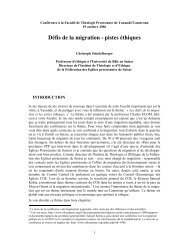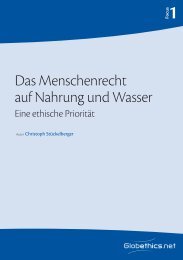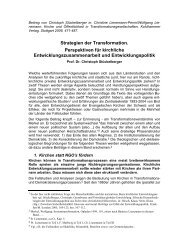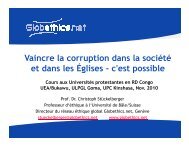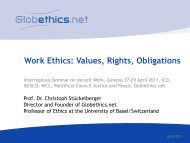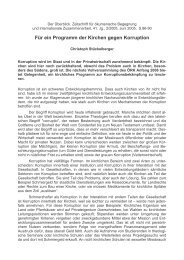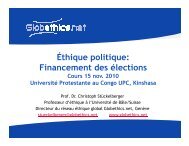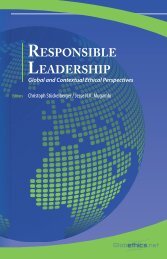BREAK THE CHAINS OF OPPRESION AND THE YOKE OF ...
BREAK THE CHAINS OF OPPRESION AND THE YOKE OF ...
BREAK THE CHAINS OF OPPRESION AND THE YOKE OF ...
Create successful ePaper yourself
Turn your PDF publications into a flip-book with our unique Google optimized e-Paper software.
Litur gy<br />
Having consulted the local university library, and - resulting from the meagre<br />
success I had in the world of academia on these matters - then consulting with<br />
colleagues in the ministry, it transpires that the latter two pairs in particular are<br />
not, or are not considered to be, natural theological companions.<br />
Instead of attempting to remedy that gap with an academic theological paper, I<br />
propose instead to offer reflections which weave from that particular Communion<br />
service at the conference to general observations gleaned from many years in<br />
parish ministry to biblical theological reflections and also pastoral considerations<br />
on the above mentioned subject matters.<br />
The liturgy which had been prepared for the above mentioned conference had<br />
laboured under the disadvantage of having been requested at short notice and<br />
with only a bible as resource material to hand. With the assistance of an Irish colleague<br />
a liturgy was crafted which drew on elements recalled from the Church of<br />
Scotland’s Book of Common order and which also made use of material which<br />
has entered the life of the Church of Scotland through the Iona Community. In<br />
its intention it was biblically grounded throughout and it had to take particular<br />
care of being accessible to those for whom English was neither a first, nor even a<br />
second, but third or even fourth language.<br />
At the time of its preparation issues of liturgical practice were reflected on – what<br />
form was the sharing of the bread and wine going to take? Matters of the theology<br />
of Holy Communion were touched on - could it be assumed that all present<br />
were grounded in a Calvinist theology of the real presence of Christ? At this<br />
stage in the conference � �we hardly � had got to �know �each<br />
others names, never<br />
mind our respective theological backgrounds. Were there any Zwinglians among<br />
us? Any closet Lutherans?<br />
And then there was the subject matter of justice: consciously it was not dealt<br />
with, unconsciously though it was a constant companion in the preparation of<br />
the liturgy for matters of justice and potential injustice required to be addressed.<br />
The conference had been called on the subject matter of ‘Communion and Justice’<br />
and delegates had travelled from all over Europe to attend. But as one of the<br />
first observations on the conference programme it was noted by one delegate<br />
that no space had been allowed for the celebration of a service of Holy Communion.<br />
And so at very short notice room was created for such a service.<br />
That such a service had not been scheduled might have indeed been an innocent<br />
oversight. But in itself it presented an injustice, maybe even a very Reformed injustice.<br />
We may claim as the notae ecclesiae the preaching of the Word and the administration<br />
of the sacraments. But in Reformed practice there is a history of a much<br />
������������������������������������������������<br />
� � � � � �����������������������<br />
�<br />
100<br />
– <strong>THE</strong> LITURGY <strong>OF</strong> HOLY COMMUNION –



